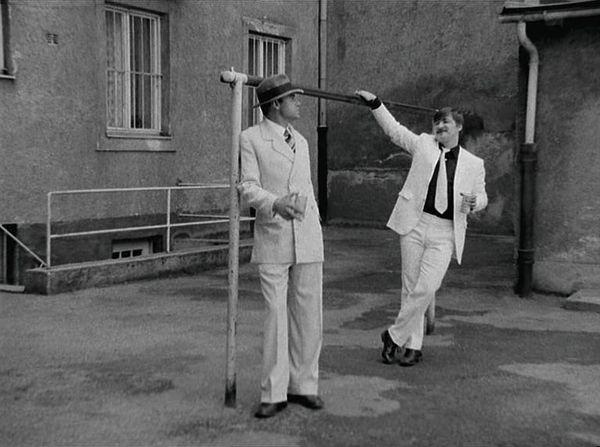Eye For Film >> Movies >> The American Soldier (1970) Film Review
The American Soldier
Reviewed by: Keith Hennessey Brown

Ricky (Karl Scheydt), a German-American Vietnam veteran, returns to Munich where he is cont(r)acted by three corrupt cops to eliminate some gangsters behind an embarrassing crime wave.
After going to work, Ricky requests that he be provided with a woman. One of the cops sends his girlfriend, Rosa (Elga Sorbas), who falls in love with Ricky, with visits to his family and friends (including the director in one of his customary appearances) adding further emotional complications...

With a hard-boiled/noir set up like this, Rainer Werner Fassbinder's The American Soldier sounds as though it should be both fun to watch, allowing its auteur to comment on themes close to his heart, such as issues of German identity and the impact of US culture on his generation – complicated here, of course, through the influence of German emigres and expressionism on American film noir – and the (ever so Brechtian) confusion of the gangster and conventional society etc.
Unfortunately while intermittently successful, through such moments as the seemingly interminable opening sequence in which some gangsters – at least that is what we will assume them to be, in what perhaps emerges as an allusion to Fritz Lang's M – play poker with pornographic playing cards and the beautifully realised slow-motion climax, the general impression one gets is of a film that has insufficient ideas to sustain itself for even its scant running time.
The issue is perhaps is that at this point in his career Fassbinder and his anti-theatre colleagues were still attempting to work out where they actually stood on providing something approaching conventional entertainment, with the distinct sense of their being reluctant to make a film that could be enjoyed on a generic level by those viewers not particularly interested in counter-cinema experiments or in on the various in-jokes (one character is named Fuller, another Wals(c)h) and homages.
Thus, while some of the noir/expressionist compositions are undeniably effective as images, there is again the sense of a certain lack of integration into the whole, that they are just there because they can be, clichéd signifiers of B-movieness that no one quite knows what to do with beyond simply creating them.
Reviewed on: 13 Nov 2007


















